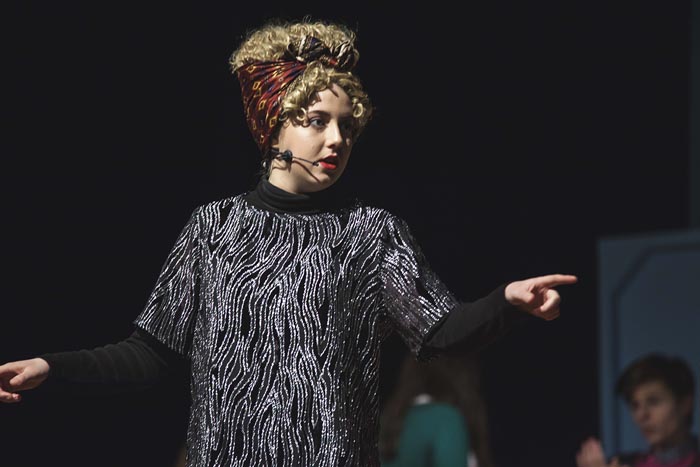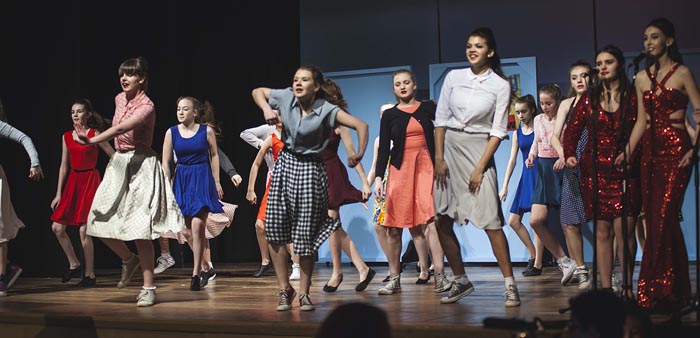Drama
 Welcome to the Drama department at Arthur Mellows Village College. The following information is intended to give an overview of the work of the department and its aims.
Welcome to the Drama department at Arthur Mellows Village College. The following information is intended to give an overview of the work of the department and its aims.Drama is essentially a practical subject which relies on the ability of participants to communicate and express their ideas and feelings in creative ways. Therefore, Drama enables students to develop an understanding of themselves and others through the creation of a range of imagined situations. The topics and themes covered by the drama curriculum enable young people to develop their sensitivity and understanding of a multicultural society.
 Through participation in a range of drama activities students develop their interpersonal and intrapersonal skills. The curriculum is designed so that students can express opinions, develop their teamwork skills, negotiate, compromise, analyse, and accept and respond to constructive criticism which are all key life skills.
Through participation in a range of drama activities students develop their interpersonal and intrapersonal skills. The curriculum is designed so that students can express opinions, develop their teamwork skills, negotiate, compromise, analyse, and accept and respond to constructive criticism which are all key life skills.As well as being an invaluable tool for the development of the social, moral and emotional intelligences of young people, drama also challenges students to use their physical and vocal skills to create complex characters. The development of improvised or scripted material for performance also challenges students to demonstrate their understanding and awareness of a range of drama techniques and performance styles.
Key Stage 3 Drama
Through the study of Drama in Years 7, 8 and 9, students explore a range of social, historical and cultural topics. Each Unit results in a practical assessment and a written evaluation which directly links to the structure of the GCSE course. The schemes of learning practiced by the department at Key Stage 3 enable the students to meet the grading criteria linked to the Drama GCSE.
GCSE Drama
The GCSE course is a creative and challenging choice of study for anyone who enjoys Drama and working as part of a team.
GCSE Drama is not only for the next Emma Watson or Johnny Depp. The study of Drama at this level will enable students to read ‘in-between-the-lines’ of human interaction through the analysis of physicality, voice and emotion. GCSE Drama is, therefore, a valuable qualification for anyone who is considering a career in a field that will require the ability to communicate with a wide range of people.

The Course
| Unit (percentage of the GCSE) | DEVISING DRAMA (30%) | PRESENTING AND PERFORMING TEXT (30%) | DRAMA: PERFORMANCE AND RESPONSE (40%) |
| How is the unit assessed? |
Practical exam (internally assessed)
A written portfolio in 3 parts: research, process and evaluation
60 MARKS
|
Practical exam
(visiting examiner)
A response to 4 questions: approx. 350 words per question
60 MARKS
|
Questions on a set text
A live theatre evaluation
80 MARKS
|
| When will it be assessed? | Spring/Summer term of Year 10 | Autumn - Spring of Year 11 | Summer term of Year 11 |
Skills Required
As well as developing their acting, improvisation and creative skills through study of the GCSE Drama course, students will also need to develop their communication, inter-personal and evaluative skills.
A Level
Why should I study Drama
The Drama and Theatre A Level is a practical, intellectual and artistic subject. You will explore the structural elements of theatre from the page to the stage. In order to be successful and enjoy this subject, you need to have keen interest in the history of drama study of practitioners, theatrical forms and conventions that make theatre such a compelling and exciting subject.
You must be able to analyse and critically deconstruct the work studied, created and witnessed. It is expected that a good level of English Literature / Language are achieved due to the critical evaluation required within the written work.
Lessons are a healthy combination of practical learning supported by the academic theory needed to understand the work being studied. Learning takes place through the following: practical workshops, research, a written portfolio (social/cultural/historical/political), rehearsals, seeing live theatre and exploration of texts. These methods increase understanding of the subject and provide you with more detail and substance to your work.
The style of homework varies according to the unit of exam work. Research, essay writing and rehearsals are all integral to the course. Four to five hours of private study/rehearsal per week are expected at A Level in addition to timetabled lessons.
1: Practitioners in Practice (40%)
Learners research and practically explore practitioners the work of others. This is assessed in the form of a devised performance and portfolio.
2: Exploring and Performing Texts (20%)
Learners will explore one performance text. This is assessed in the form of a performance which is externally assessed.
3: Analysing Performance (20%)
2 hours 15 minutes written exam
Learners will study two texts which focus on a particular theme. In the examination they will answer questions about how they would practically communicate the themes in the texts.
4: Deconstructing Texts for Performance (20%)
1 hour 45 minutes written exam
Learners will interpret and explore practically a performance text considering how to create, develop and direct a performance for an audience.
Where can it lead?
This course can lead you to study Drama at university, Drama school or Performing Arts College. Many students go to study Drama and Theatre Studies or Performing Arts at a higher level and progress to working in theatre, television, film and video. It could be invaluable in the journalistic, teaching and legal professions.
When students study Drama and Theatre Studies at A Level it invests the individual with invaluable skills in articulating thoughts, exploring ideas, sharpening communication skills and providing the ability to work within a group situation both in practical and academic setting. All of these transferable skills can be used in all subjects and in all careers.
‘Drama is life with the dull bits cut out’
– Alfred Hitchcock
What qualifications do I need to start?
This exciting but demanding course requires great commitment and thinking skills and above all a passion for drama in all its aspects – reading, directing, designing and acting. Teamwork is vital. Drama and Theatre Studies is one of the only AS subjects where your final result depends on the work of others - and vice versa.
A grade 6 / B or above in GCSE Drama and a grade 5 in GCSE English Literature is also essential to support the critical and analytical aspects of Drama theory.
Useful Links


